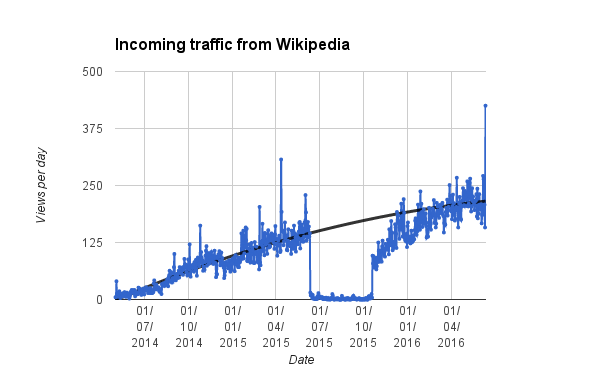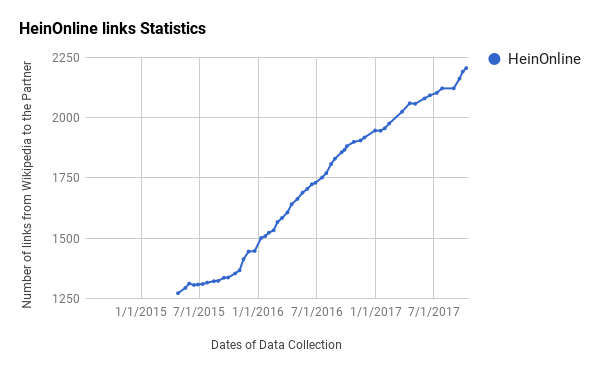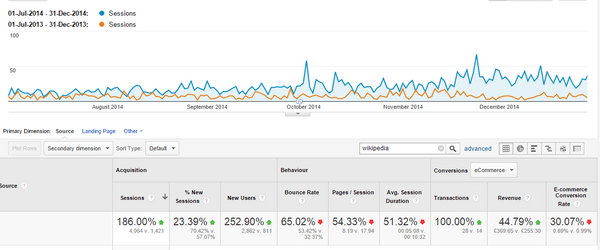Wikipedia:The Wikipedia Library/Publishers
The case for collaboration
[edit]Wikipedia's importance
[edit]- 5th most visited website on the entire internet
- 500 million monthly visitors
- 8000 views per second
- #6 top-referrer to all scholarly articles online,[1] with millions of citation clicks per month.[2]
- Contains over 29 million citations on the English Wikipedia alone
Wikipedia is a ubiquitous starting point for research. Students, librarians, even doctors check Wikipedia to begin their research, get an overview of a field, find relevant sources, and engage with the popular conception and summary of a subject.
In the modern information age, search no longer begins at the library or the archive. It begins with a Google search and typically goes next to the top-linked Wikipedia article. There's a saying in the library world that discovery happens elsewhere[3] (meaning not at the library itself). What is less often mentioned is that these days, elsewhere is Wikipedia.
We know people are starting their searches on the open web, and even on Wikipedia directly. Working with the Wikipedia community allows publishers to expose their authoritative collections and continue a conversation about how to get researchers from sources on the web, back to the library or archive, where they can access those resources directly and discover even more to help them with their information needs.
The Wikipedia Library Mission
[edit]Our motivation is addressing the biggest challenges facing information professionals today: discovery and access. For libraries and publishers, the challenge today is having their resources found and used when many students and the public start their research on Wikipedia. This puts us in a unique position where collaboration just makes sense.
For our readers who often do not have free, direct, or easy access to major paywalled journals or niche archives, Wikipedia has become a ubiquitous gateway for access. Not all information is free, but most information can (and hopefully will soon be) at least summarized and cited on Wikipedia. For libraries and publishers, Wikipedia's wealth of eyeballs means that it is an unparalleled opportunity for exposure and dissemination of content.
The question we then ask is how to get the highest quality information on Wikipedia and to get our readers to dig deeply into it. After all, our goal is to make Wikipedia not an end point for research but a starting point for deeper learning.
We want Wikipedia to be a major component of a circle of research and dissemination: where librarians, academics, and publishers contribute their sources and expertise—and where Wikipedia leads its massive 500 million monthly readership back to information professionals, scholarly resources, and full texts.
Mutual Benefit: Access Partnerships
[edit]How it works
[edit]It's a pretty simple model - you provide a group of qualified and prolific Wikipedia editors free access to your resources, and they use that access to write content on Wikipedia, adding citations back to the source. You can choose to provide a set number of accounts (say, 100) which we distribute through an application-and-approval process, or add your collections to the Library Bundle - a set of resources to which all editors meeting certain activity criteria have immediate access. We support IP-based authentication via EZProxy to facilitate this access, but can distribute individual accounts if you can't support this.
The access relationship is ultimately between you and the individual editors, so in addition to all of our signup and usage expectations, all of your terms of service still apply. Most important of these are the restrictions on access: no mass scraping, downloading, distributing, or datamining — and no sharing accounts with others.
The Wikimedia community patrols proper usage of resources per our inherent commitment to avoiding copyright violations (Wikipedia is very open, but we cannot share copyrighted content while maintaining an open license).
Editors then use their access to cite and link directly to your resources across Wikipedia articles. When readers of Wikipedia articles check a reference on Wikipedia and follow the link, it will lead them to your site, providing increased visibility and the potential for broader awareness of your services (and possibly new users).
We will provide you with a means to keep updated about the number of links editors are adding to your content, in addition to insights about where your content has been cited. We also love to collaborate on social media, press releases, and blog posts highlighting our partnerships.
That is the basic sketch, but the details are all customizable to your needs, comfort level, and preferences.
Benefits
[edit]- Enhanced discovery with Wikipedia's 8000 views per second and 500 million unique monthly visitors
- Some of our partners have seen 300–600% increases in the number of external links on Wikipedia
- Some have seen incoming traffic rises of 200% as readers click citations on live Wikipedia articles
- Fully managed process awarding accounts to trusted and experienced Wikipedia subject experts
- Policy and copyright protections with clear expectations under your terms of use
- Shared social media, press releases, blog posts, and community-wide promotion
- Join in a fantastic opportunity to improve the world's encyclopedia, a true public good
Increased Incoming Traffic from Wikipedia

The region with low/zero views was a temporary result of our switch to HTTPS.
- Mission advancement
- Opportunity to improve the content on the largest encyclopedia in the history of the world
- Deep altruistic motivation to improve a public good which benefits everyone
- Alignment with organizational goals to spread high-quality information to the public
- Exposure and promotion
- Visibility within the community as having helped out with an essential aspect of site operations
- Social media, blog, and newsletter mentions
- Opportunity to announce partnerships through internal press releases
- Direct links within references back to source websites and articles
- Customized userboxes for editors to announce their access
- High impact on viewership and readers
- Tremendous leverage of highly trafficked Wikipedia articles, often the most read source on that subject in the world
- Increased usage of resources as citations on Wikipedia
- Wikipedia conducts metrics analysis of entire site to determine resource citation rates
- Wikipedia editors provide global exposure to resources beyond the value of purchasing an individual license
- Greater awareness among readers who follow links that the resources exist and are of useful quality
- Security and predictability
- Only highly active, experienced editors receive accounts
- Because of strict signup requirements, very little risk of cannibalizing primary revenue streams
- Wikipedia editors respect copyright and do not plagiarize from articles.
- Wikipedia editors do not share their account logins
- Account recipients can agree to appropriate and necessary terms of use
- Programs with many of the top databases in the world have been running successfully for years
- Easy and flexible implementation
- Wikipedia handles the entire signup, distribution, and account management process
- No contract or formal agreement required
- Wikipedia handles all customer service issues directly with participants
- Ability to trial programs with a limited number of accounts
- Freedom to select whatever number of donated accounts works for the organization
- Opportunity to review metrics before expanding or renewing partnerships
- IP Authentication-based access means you don't need to do any ongoing account setup
Our partners
[edit]The Wikipedia Library currently offers editors access to over 80,000 unique periodicals and a greater number of books.
Frequently asked questions
[edit]What is The Wikipedia Library? The Wikipedia Library is a program at the non-profit Wikimedia Foundation which runs Wikipedia and its sister projects. We help our editors and readers connect to the highest quality research resources available. We set up access partnerships between trusted publishers and top Wikipedia editors.
Are access partnerships license purchases or donations? We partner with publishers to give our top editors free access to your resources so that they can do research and write articles. In return, we promote the donation widely within our community and on social media; our editors use your resources to improve encyclopedia content; and cite your publications directly in Wikipedia articles with links back to your site. We view the relationship as one of mutually beneficial donations.
What is the benefit to publishers? Wikipedia is the 5th most trafficked website in the world with 8,000 views per second and 500 million unique visitors each month. Citations to your source on our site help us improve the quality of content to those visitors while improving the visibility of your resources. We can advance both our organization's missions.
What kind of traffic increases have your partners seen? Some partner sites have seen 300–600% increases in outgoing links from Wikipedia to their site and 200% increases in incoming traffic. We provide a dashboard for monitoring citations so you know the impact your donation is having.
How is the donation process managed? We handle the entire management process and select the best editors. We either vet their experience, activity, and expertise, or use technical criteria capable of doing so automatically. We set clear expectations and requirements. We handle most troubleshooting and customer service.
How is copyright protected? We take copyright and access rights very seriously and expect our editors to respect your terms of service. Wikipedia is an open resource, which means all of the content on it must abide by strict copyright compatibility. Your concerns about copyright are our concerns too. Editors cannot share account access with others, mass scrape or download content, copy and paste directly from sources into articles, or otherwise violate your terms of use.
How is access delivered? We prefer to facilitate access via IP authentication (we use EZProxy). If that's not an access method you can support, we're happy to work with you on a manually-distributed method, such as access codes.
How many research accounts are typically donated? We work within your goals and comfort level. For subject-specific resources, we might aim for 50 accounts. For a more widely applicable reference we've gone as high as 1 or 2 thousand. It's up to you, but we can provide guidance about expected demand. Account access generally lasts for 1 year, after which time we are happy to reevaluate and renew. We are always happy to start small and do a pilot run with 25–100 accounts so we can see how it is going.
We're interested in a donation, what is the next step? Find out who would be a good person in your organization to talk to about this opportunity. We work with editorial, publishing, marketing, business development, and nonprofit departments. We’d love to chat about how we could work together. It would really be a meaningful contribution to our community.
Next steps!
[edit]- You select a product and a number of accounts
- We review and sign an MOU
- We set up a signup page like https://wikipedialibrary.wmflabs.org/partners/55/
- We decide how exactly is easiest to set up access (e.g. manual setup, authentication)
- We promote open signups, vet editors, collect necessary information, and transfer editors access
- We collaborate on some optional social media or press releases if you'd like
- Our editors hopefully make good use of your content to Wikipedia
- We provide you with metrics about the number of links from Wikipedia
The whole setup process can take as little as a few weeks.
Contact us
[edit]Please reach out anytime to:
Sam Walton
swalton![]() wikimedia.org
wikimedia.org
or at our general email:
wikipedialibrary![]() wikimedia.org
wikimedia.org
 |
- ^ Joe Wass (19 May 2016). "Where do DOI clicks come from?". CrossRef. Retrieved 19 May 2016.
- ^ Quantifying Engagement with Citations on Wikipedia
- ^ Dempsey, Lorcan. "Discovery happens elsewhere". Lorcan Dempsey's Weblog. Retrieved 21 January 2015.





